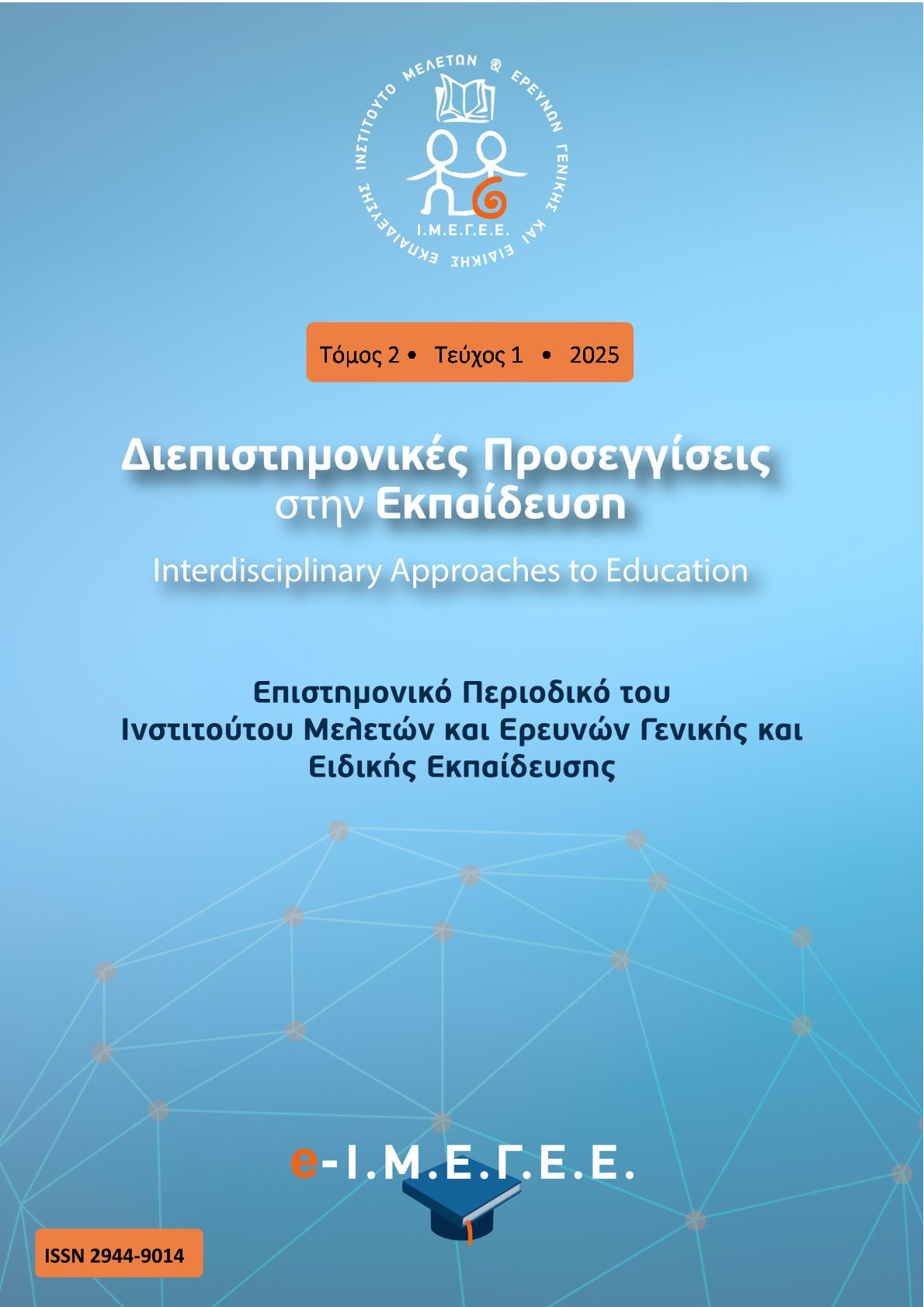Συσχετίσεις γνωστικών και μαθησιακών παραμέτρων με την αναγνωστική κατανόηση επιχειρηματολογικών κειμένων σε μαθητές Γυμνασίου με επίμονα χαμηλή αναγνωστική επίδοση

Περίληψη
Η παρούσα έρευνα μελετά τις συσχετίσεις μεταξύ διάφορων γνωστικών και μαθησιακών παραμέτρων αφενός και της αναγνωστικής κατανόησης επιχειρηματολογικών κειμένων αφετέρου, σε μαθητές Γυμνασίου με Ειδικές Μαθησιακές Δυσκολίες (ΕΜΔ) και σε συμμαθητές τους με Χαμηλή Αναγνωστική Επίδοση (ΧΑΕ) αδιευκρίνιστης αιτιολογίας. Ειδικότερα, διερευνήθηκε το αν και κατά πόσο το πρότυπο αυτών των συσχετίσεων διαφοροποιείται μεταξύ των δύο υποομάδων μαθητών. Στην έρευνα συμμετείχαν 59 μαθητές και μαθήτριες της Α΄ Γυμνασίου (ηλικίας 12–13 ετών) από τους νομούς Θεσσαλονίκης, Γρεβενών, Σερρών και Ημαθίας. Όλοι οι συμμετέχοντες αξιολογήθηκαν στην αποκωδικοποιητική ακρίβεια, την αναγνωστική ευχέρεια, τη σημασιολογική γνώση, τη μνήμη εργασίας και την αναγνωστική κατανόηση, μέσω τυποποιημένων και μη τυποποιημένων (αυτοσχέδιων) εργαλείων αξιολόγησης. Σύμφωνα με τα αποτελέσματα των αναλύσεων, και στις δύο ομάδες μαθητών διαπιστώθηκε στατιστικά σημαντική θετική συσχέτιση μεταξύ της επίδοσης στην αναγνωστική κατανόηση επιχειρηματολογικών κειμένων και των γνωστικών και μαθησιακών παραμέτρων, με εξαίρεση τη μνήμη εργασίας. Στην ομάδα μαθητών με ΕΜΔ, η ισχύς όλων των συσχετίσεων ήταν μέτρια (rs= 0.359–0.456), με εξαίρεση τη συσχέτιση μεταξύ της κλίμακας αξιολόγησης της κατανόησης του Τεστ-Α και της αναγνωστικής κατανόησης επιχειρηματολογικών κειμένων, η οποία ήταν υψηλή (rs = 0.637). Στην ομάδα μαθητών με ΧΑΕ, η ισχύς όλων των συσχετίσεων ήταν υψηλή (rs= 0.524–0.606), με εξαίρεση τη συσχέτιση μεταξύ της αναγνωστικής ευχέρειας και της αναγνωστικής κατανόησης επιχειρηματολογικών κειμένων, η οποία ήταν μέτρια (rs = 0.419). Συμπερασματικά, το πρότυπο συσχετίσεων των γνωστικών και μαθησιακών παραμέτρων με την αναγνωστική κατανόηση μεταξύ των δύο ομάδων παρουσίασε ομοιότητες ως προς τις παραμέτρους που εμφάνισαν στατιστικά σημαντική συσχέτιση με την αναγνωστική κατανόηση επιχειρηματολογικών κειμένων, αλλά και διαφορές κυρίως ως προς την ισχύ αυτών των συσχετίσεων.
Λεπτομέρειες άρθρου
- Πώς να δημιουργήσετε Αναφορές
-
ΚΙΡΠΟΥΙΚΗ Α., & ΑΓΑΛΙΩΤΗΣ Ι. (2025). Συσχετίσεις γνωστικών και μαθησιακών παραμέτρων με την αναγνωστική κατανόηση επιχειρηματολογικών κειμένων σε μαθητές Γυμνασίου με επίμονα χαμηλή αναγνωστική επίδοση. Διεπιστημονικές Προσεγγίσεις στην Εκπαίδευση, 2(1). https://doi.org/10.12681/.40411
- Ενότητα
- Articles
Ενημέρωση για τα πνευματικά δικαιώματα
Οι συγγραφείς των άρθρων που δημοσιεύονται στο περιοδικό διατηρούν τα δικαιώματα πνευματικής ιδιοκτησίας επί των άρθρων τους, δίνοντας στο περιοδικό το δικαίωμα της πρώτης δημοσίευσης. Άρθρα που δημοσιεύονται στο περιοδικό διατίθενται με άδεια Creative Commons 4.0 και σύμφωνα με την άδεια μπορούν να χρησιμοποιούνται ελεύθερα, με αναφορά στο/στη συγγραφέα και στην πρώτη δημοσίευση για μη κερδοσκοπικούς σκοπούς και με δικαίωμα τροποποίησης μόνον με παρόμοια διανομή (αν αναμείξετε, τροποποιήσετε, ή δημιουργήσετε πάνω στο υλικό, πρέπει να διανείμετε τις δικές σας συνεισφορές υπό την ίδια άδεια όπως και το πρωτότυπο).
Απαγορεύεται η αντιγραφή, αποθήκευση και διανομή της παρούσας εργασίας, εξ’ολοκλήρου ή τμήματος αυτής, για εμπορικό σκοπό. Επιτρέπεται η ανατύπωση, αποθήκευση και διανομή για σκοπό µη κερδοσκοπικό, εκπαιδευτικής ή ερευνητικής φύσης, υπό την προϋπόθεση να αναφέρεται η πηγή προέλευσης και να διατηρείται το παρόν µήνυµα. Ερωτήματα που αφορούν τη χρήση της εργασίας για κερδοσκοπικό σκοπό πρέπει να απευθύνονται προς τους συγγραφεα-είς. Οι απόψεις και τα συμπεράσματα που περιέχονται σε αυτό το έγγραφο εκφράζουν το-ους συγγραφέα-είς και δεν πρέπει να ερμηνευθεί ότι αντιπροσωπεύουν τις επίσηµες θέσεις του Ινστιτούτου Μελετών και Eρευνών Γενικής και Ειδικής Εκπαίδευσης (Ι.Μ.Ε.Γ.Ε.Ε.).
Copyright notice
Authors retain copyright and grant the journal right of first publication with the work simultaneously licensed under a Creative Commons Attribution NonCommercial License that allows others to share the work with an acknowledgement of the work's authorship and initial publication in this journal.


